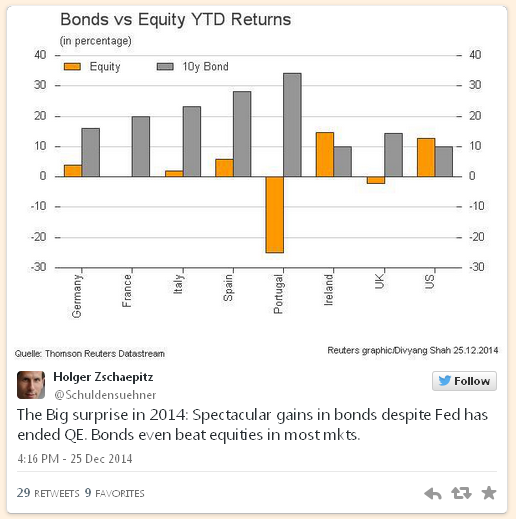Investing.com’s stocks of the week
According to provisional calculations, the Swiss National Bank (SNB) will report a profit in the order of CH 38 billion for the 2014 financial year. The profit on foreign currency positions amounted to some CHF 34 billion. Of this, CHF 9 billion were accounted for by interest and dividend income, CHF 13 billion by price gains and CHF 12 billion by exchange rate gains. A valuation gain of CHF 4 billion was recorded on the gold holdings.
Essentially the SNB results indicated that they obtained gains on everything.
1) Interest and Dividends led to 9 billion income: On a balance sheet of 530 billion, this is a yield of 1.7%.
2) Price gains of 13 billion CHF.
SNB’s portfolio still contains over 70% safe bonds, in particular US treasuries and German bunds. In 2014, however, government bonds were the biggest winners and were able to outpace the performance of stocks.
Around 15% of the SNB portfolio are equities. Stocks, in particular American ones, saw price increases of 8.8% in 2014, while the DAX was up 3.9% and most other European markets had a negative performance in 2014. (see the performance of stock markets in 2014). On the other side, Swiss equities were up 10.1%. The SNB does not buy Swiss stocks, but valuation effects have an implication on interventions.

Based on the balance of payments model, higher stock valuations of CHF stocks than the European counterparts is an indication that the SNB must intervene and “fill the valuation gap” versus the minimum EUR/CHF rate. In this case it concerns primarly risk-on flows, i.e. stocks.
3) 12 billion exchange rate gains.
Thanks the ECB decision to move towards Quantitative Easing, both the euro and Swiss franc, heavily weakened against the dollar. The bank had a big gain on the dollar, that constituted of the 27% of the currency exposure and – thanks to rising valuations – 29% in Q3. With the global slowing, “other currencies” in the SNB portfolio like AUD and SEK lost value. The euro depreciated from 1.2303 at the end of 2013 to 1.2010 in 2014. CHF appreciated from 97 to 117 JPY. Despite weaker EUR, JPY, AUD and SEK, strong dollar gains outweighted the losses. The British pound appoved slightly against 2013 in CHF terms, while CAD was broadly unchanged.
4) 4 billion CHF gains on gold.
Strangely, gold appreciated in 2014, despite a stronger dollar. The reason can be seen in the deliberate devaluation policy of BoJ and ECB.
